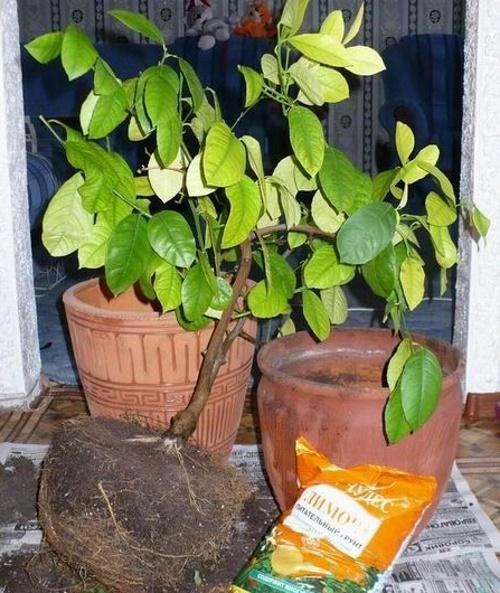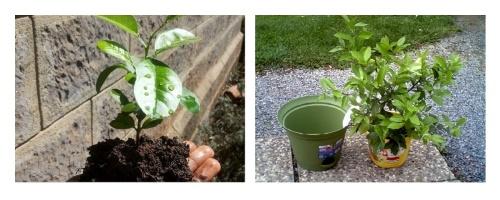How to transplant a lemon - the subtleties of the procedure
 Indoor lemons, like our other green pets, cannot spend their entire life in one pot and without changing the land. Growing up, the tree gradually selects useful substances from the soil and builds up the root system. Over time, lemon already needs more space and fresh, nutritious soil. How to understand that a plant needs replanting, and how to transplant a lemon?
Indoor lemons, like our other green pets, cannot spend their entire life in one pot and without changing the land. Growing up, the tree gradually selects useful substances from the soil and builds up the root system. Over time, lemon already needs more space and fresh, nutritious soil. How to understand that a plant needs replanting, and how to transplant a lemon?
When to replant lemon

- they do not grow, do not bloom, adult specimens do not bear fruit;
- the old flowerpot has become too small (protruding roots are visible from the drainage holes and / or on the surface of the soil);
- the earth began to emit a putrid smell;
- midges started in the pot;
- the plant is affected by a fungal or viral disease (the leaves wilt, rot, dry or become stained);
- appeared on the tree pests;
- the pot was accidentally broken.
The optimal time for a transplant is the end of February or summer. Lemons affected by disease or pests should be replanted immediately.
Pot and soil selection
 Lemons can grow in any type of flowerpot, be it ceramic, wood, or plastic. However, there is one prerequisite: the container must have drainage holes at the bottom. Otherwise, water will stagnate in the pot, which means that the roots will quickly begin to rot. As for the size, too large flowerpots should not be used. In order for a lemon to bear fruit, its roots must be cramped. In spacious pots, the plant will devote all its energy to building roots to fill the space.
Lemons can grow in any type of flowerpot, be it ceramic, wood, or plastic. However, there is one prerequisite: the container must have drainage holes at the bottom. Otherwise, water will stagnate in the pot, which means that the roots will quickly begin to rot. As for the size, too large flowerpots should not be used. In order for a lemon to bear fruit, its roots must be cramped. In spacious pots, the plant will devote all its energy to building roots to fill the space.
When transplanting a young lemon, a new flowerpot should be only 2-3 cm wider in diameter, and for adult trees - 5-7 cm.
With regard to soil, the easiest option is to purchase a ready-made citrus substrate. If desired, the soil mixture can be prepared independently by mixing deciduous soil, sand and humus in a ratio of 3: 1: 1.
How to transplant a lemon - step by step recommendations
In order for citrus fruits to painlessly survive the transplant and take root safely, it is necessary to carry it out correctly, namely:
- Carefully remove the bush from the old pot. If this is a young lemon, which is healthy and just grew out of a flowerpot, the roots need not be freed from the ground.

- If there are signs of disease or pests, be sure to shake off all the soil from the roots. Cut off those that are broken and rotten, as well as damaged shoots. Treat the remaining healthy roots with a fungicide.

- Put drainage on the bottom of the new pot and cover it with a layer of earth.

- Healthy lemons can be transplanted together with a clod of earth by transshipment. They just need to be installed in the center of the flowerpot and pour the soil into the voids, slightly tamping them.

- Plants with an open root system are also placed in the center of the container and the roots spread out. Top up the substrate so that the root collar is at the soil level.

If the roots of an adult lemon are very long, you can shorten them a little.
The transplanted lemon only needs to be watered. If the soil settles after watering, you can add some more soil.
Lemon transplant video